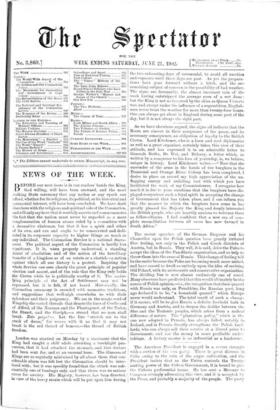NEWS OF THE WEEK.
BEFORE our next issue is in our readers' hands the King,
- God willing, will have been crowned, and the most striking State ceremony that any nation or any epoch can afford, whether for its religious, its political, or its historical and ceremonial interest, will have been concluded. We have dealt elsewhere with the religious and spiritual side of the Coronation, and will only say here that it worthily asserts and commemorates the fact that the nation must never be regarded as a mere conglomeration of human atoms ruled by a committee with a decorative chairman, but that it has a spirit and ethos of its .own, and can and ought to be consecrated and dedi- cated in its corporate capacity to higher things as much as any individual. The Coronation Service is a national Sacra- ment. The political aspect of the Coronation is hardly less significant. It is, when properly understood, a standing denial of absolutism and of the notion of the hereditary transfer of a kingdom as of an estate or a chattel,—a notion against which all our history is a protest. Inspiring the whole Service one sees clearly the great principle of popular election and assent, and of the rule that the King only bolds the Crown while be is politically worthy of it. The under- lying principle of the Act of Settlement may not be expressed, but it is felt, if not heard. Historically, the Coronation ceremony is crowded with memories, traditions, and suggestions that well-nigh overwhelm us with their splendour and their poignancy. We see in the magic cord of Kingship the varied threads that denote the lines of Cerdic and of Alfred, of the Norman and the Plantagenet, of the Tudor, the Stuart, and the Guelph,---a strand that no man shall break. Esto perpetva. Let the line "stretch out to the crack of doom," for woven with it so that it may not break is the red thread of honour,—the thread of British freedom.






































